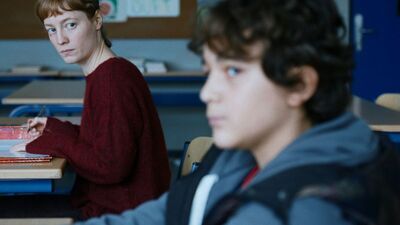It seems to me you’re also interrogating how the scapegoat is also often the furthest down the ladder, the furthest from privilege.
Exactly.
How much is that social status important to this story? Social, racial, all the things that determine who ultimately ends up the scapegoat.
Absolutely. In the whole identity politics debate, people talked a lot about race and gender, but nobody talked about class. I thought this woman in my film – she’s the first one to get to school, she’s the last one to leave, she’s a single mother, and she earns less than everyone else. She’s still the one that is friendly to everybody all the time. I wanted that character to be – even if she gets accused and excluded from the school, I wanted her to not be a victim. That was one of the rules that we had in the writers’ room. There are no victims in this story, and nobody ever backs down. That’s how you create drama. There’s nothing more boring than harmony. It’s not just her. It’s that our teacher is of Polish origin and doesn’t want to speak her own language in the school. Or the fact that the first kid that gets singled out is a Turkish kid. That’s all me growing up as a Brown person in Germany. On the one hand, you’re trying to fit in and speak their language and kind of hide your heritage. On the other hand, you’re the Brown person that gets racially profiled for no reason. How many times have I been stopped by police? So the film deals with a lot of these things. It’s got a lot to do with me.

There’s a lot of your education in this film?
I co-wrote this with Johannes Duncker, and we went to school together. Our school was actually a pretty good school in Istanbul. We went to the German school in Istanbul, and back in our time, there was a series of thefts. We all knew that two boys were actually stealing, but nobody wanted to snitch. One day, something happened and three teachers came in and frisked us. Back then, we didn’t question it. They were the teachers. When we first gave this script to educators, they said that it happened quite often, but you cannot do that anymore without the police or you would have to say it was voluntary. So that opened up something interesting: You can say something is voluntary, but if you are in a hierarchy, and especially if you’re a kid, you need some balls to say no. So that incident was kind of the kick-off for this story. We were thinking about truth and proof. How absurd the whole notion of truth has become in recent years with Trump and Fake News and Cancel Culture. There are a lot of observations of everyday life.
A lot of people have said it’s a microcosm of political structures or society and I wondered how deliberate that was – it sounds like that was the intent all along. Would that be accurate?
Absolutely. We were very much aware of school being a miniature for society. Very intentional.
Why 4:3? Why the tight frame?
There was something about 4:3 that isolated the characters. Since this is about a woman who can’t really connect with anybody at the school, we thought that it was important. It’s also kind of like our own time in school, a reminiscence about it almost like a Polaroid. Ultimately, my DP Judith Kaufmann, who is like the best person ever, she’s been around, she said, “I’ve never done this. Let’s try it.” When you’re working in a new format, you’re looking differently. If we had shot this in scope, I could probably tell you ten reasons why too. (Laughs.)

